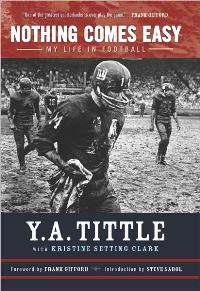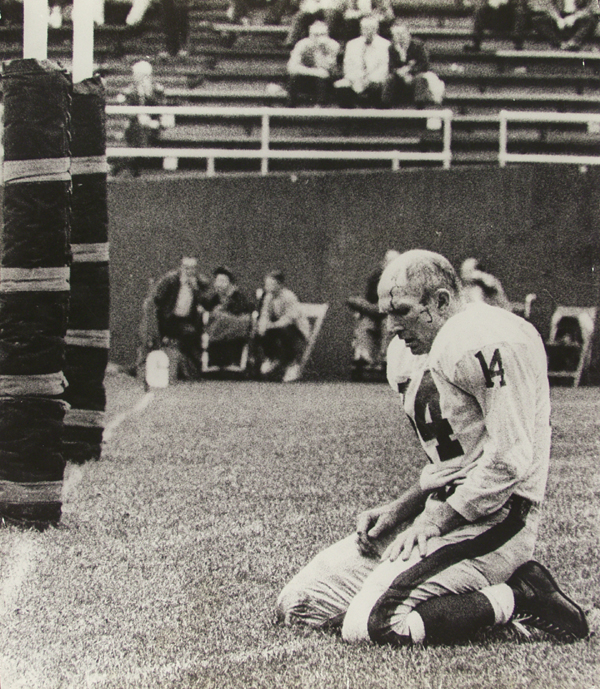|
| |
Back
to Articles Menu
Book Report: Nothing Comes Easy
by
Randy Snow
Originally
posted on AmericanChronicle.com, Sunday, January 31, 2010
In his new autobiography, Nothing Comes Easy,
Pro Football Hall of Famer Y.A. Tittle tells the story of his incredible
football career. Published in 2009, the book is co-authored by Dr. Kristine
Setting Clark. You may know Tittle's name or the famous picture of him kneeling
in the end zone during an NFL game with blood on his face, but other than that,
you may not know that much about him.
 Tittle
grew up in Marshall, Texas, which is also the hometown of another Hall of Fame
quarterback, Sammy Baugh. Tittle developed his passion for playing football in
the fourth grade. He suffered from asthma as a child and all throughout his high
school playing career, but he kept that hidden from his coaches, fearing they
might bench him if they knew. Tittle
grew up in Marshall, Texas, which is also the hometown of another Hall of Fame
quarterback, Sammy Baugh. Tittle developed his passion for playing football in
the fourth grade. He suffered from asthma as a child and all throughout his high
school playing career, but he kept that hidden from his coaches, fearing they
might bench him if they knew.
In the spring of 1944, just before he graduated from high school, Tittle was
drafted into the military. But when he went for his induction physical, he was
classified 4-F, which meant he was physically unsuitable for military service.
After graduating from high school, Tittle attended summer classes at the
University of Texas in Austin where he met fellow quarterback Bobby Layne.
Tittle did not like the school and after only a few weeks, he left to attend
Louisiana State University.
During his junior year at LSU, he was told by a representative of the Cleveland
Browns that he had been drafted by the team. At the time, the Browns were
members of the All American Football Conference, which was a rival league to the
NFL. After pointing out to the man that he was only a junior, Tittle did not
hear from the man again until after the last football game of his senior season
in 1947. Soon after, Tittle signed a $10,000 contract with the Browns. However,
before the 1948 AAFC season began, the Browns traded him to the league's
Baltimore Colts.
Tittle played for the Colts for three seasons, 1948-1950. After the 1949 season,
the AAFC merged with the NFL but only three AAFC franchises actually became NFL
teams, the Baltimore Colts, Cleveland Browns and the San Francisco 49ers.
After the 1950 season, the Colts team folded after posting a 1-11 record for a
second straight season. Tittle was picked up by the San Francisco 49ers. (A new
Baltimore Colts team was formed in 1953 when the NFL moved the Dallas Texans
franchise to Baltimore)
Tittle did not become the full time starter in San Francisco until the 1953
season. When he got there, the quarterback was Frankie Albert, a local favorite
who had been playing for the team for a few years. Albert retired after the 1952
season and Tittle finally became the starter. Albert returned to the team in
1956, but this time as the team's head coach. Albert coached the team through
the 1958 season.
While Tittle was playing for the 49ers, tragedy struck the team when owner Tony
Morabito died of a heart attack in the owner's box on October 27, 1957. His
death occurred during a home game against the Chicago Bears at Kezar Stadium.
Tittle also had one of his best seasons statistically in 1957. He completed 63
percent of his passes that season and was named NFL Player of the Year.
Tittle shared the backfield in San Francisco with three other future Hall of
Fame players. They were known as "The Million Dollar Backfield." The others were
fullback Joe Perry (HOF Class of 1969), fullback John Henry Johnson (HOF Class
of 1987) and halfback Hugh McElhenny (HOF Class of 1970).
In 1959, Red Hickey became the head coach of the 49ers. He installed a new
formation he created called the Shotgun formation. This new formation, in which
the quarterback lines up five to seven yards behind the center, did not play
well to Tittle's strengths as a quarterback. Nineteen fifty nine was also the
season that Tittle was diagnosed with Meniere's disease, a rare condition of the
inner ear that causes dizziness and affects a person's balance. He was able to
continue playing however because the condition usually flared up during the
middle of the week and not on Sundays.
During the 1961 pre-season, Tittle was traded
to the New York Giants. The 49ers had quarterback John Brodie and had just
drafted tailback Billy Kilmer from UCLA who could scramble and throw the option
pass, so Tittle became expendable.
On the first play of his first preseason game in a Giant's uniform, Tittle
fumble the snap. He recovered the ball and tried to scramble, but was tackled
hard by two Los Angeles Rams defenders, injuring his back. He was out of action
for the next six weeks. When he recovered from his back injury, he shared the
quarterbacking duties with Charlie Conerly. The Giants went on to win the
Eastern Division championship that year, but lost in the NFL championship game
to the Green Bay Packers, 37-0. Tittle, however, was named NFL MVP.
In 1962, Frank Gifford came out of retirement and rejoined the Giants. Gifford
had retired in 1960 after suffering a head injury in a game against the
Philadelphia Eagles. When he came back to the team, he switched from running
back to wide receiver.
Title earned a reputation for not being able to win the big one. He played in
three consecutive NFL title games from 1961-1963 and lost them all, the first
two to the Green Bay Packers and the third to the Chicago Bears.
 Tittle's
legacy in pro football will forever be associated with a single photograph taken
of him on September 20, 1964. During a road
game against the Pittsburgh Steelers, photographer Morris Berman of the
Pittsburgh Post-Gazette captured the image of Tittle after being hit by Steelers
defensive end John Baker. On the play, Tittle suffered a cracked sternum, a gash
on his forehead, crushed cartilage in his ribs and a concussion. Sports
Illustrated called it the Photo of the Century in 1964. The photo was also used
years later by Baker in his campaign to be elected sheriff of Wake County in
North Carolina. The picture was featured in campaign posters accompanied by a
caption that read, "If you don't obey the law, this is what Big John will do to
you!" Baker won the election and served as sheriff for 24 years. Tittle's
legacy in pro football will forever be associated with a single photograph taken
of him on September 20, 1964. During a road
game against the Pittsburgh Steelers, photographer Morris Berman of the
Pittsburgh Post-Gazette captured the image of Tittle after being hit by Steelers
defensive end John Baker. On the play, Tittle suffered a cracked sternum, a gash
on his forehead, crushed cartilage in his ribs and a concussion. Sports
Illustrated called it the Photo of the Century in 1964. The photo was also used
years later by Baker in his campaign to be elected sheriff of Wake County in
North Carolina. The picture was featured in campaign posters accompanied by a
caption that read, "If you don't obey the law, this is what Big John will do to
you!" Baker won the election and served as sheriff for 24 years.
Tittle and Gifford both retired after the 1964 season. Tittle, who also played
in seven Pro Bowls, went on to be an offensive consultant with the 49er from
1965-1969. The forward of the book is written by Frank Gifford.
Tittle was inducted into the Pro Football Hall of Fame in 1971 along with
Packers coach Vince Lombardi and Cleveland Browns running back Jim Brown. He was
the first quarterback to ever be inducted who had never won a championship.
Gifford was inducted into the Hall of Fame in 1977.
Tittle also made a cameo in the 1999 movie, Any Given Sunday. He played the
coach of one of the opposing teams.
In case you were wondering, Y.A. Tittle was
named after his father, Yelberton Abraham, Sr. How ironic is it that a man who
was classified as unfit for military service, ended up in the Pro Football Hall
of Fame!
LINKS
The official Y.A. Tittle web
site
Y.A. Tittle page on the Pro Football Hall of Fame web site
Back
to Articles Menu
|
